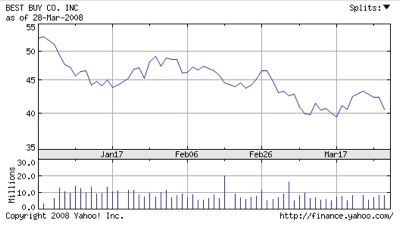As a followup to my previous post about Best Buy planning to step up its corporate VC activity, I thought it would be good to get some additional perspective on this news. So, I sought out a couple of my contacts inside the company. 
I couldn’t think of anyone better than Robert Stephens, founder of the Geek Squad, which was acquired by Best Buy about five years ago. (He was out on vacation last week when the news broke.) Robert still heads the Geek Squad — in an environment much different from his early days, but one he says he very much enjoys. And the business has expanded significantly. Robert’s a great guy, an entrepreneur’s entrepreneur. In fact, he was named the University of Minnesota’s Entrepreneur of the Year in 2007, and I blogged about the event where that was announced (the Minnesota Cup Awards), and about Robert’s excellent talk there.
I asked Robert two questions about the recent development at Best Buy:
Tech-Surf-Blog: What’s your take on the news about the formation of "Best Buy Capital"?
Robert Stephens: This is just the most recent example of a trend that other companies like Intel, Google, and Yahoo have championed. I think it offers another choice for the entrepreneur. I chose not to take VC money or other investors because I did not want to see The Geek Squad bought and sold by people just looking for a financial transaction. The Geek Squad chose to acquire Best Buy because we really help each other in a permanent way. We help differentiate Best Buy, and we are able to use their size and resources in our quest for World Domination.
With all of the new web technologies and speed of software development, there are some hardware and software products that might be a better fit through partnership with a Best Buy rather than a traditional VC path. Choice is always good.
Tech-Surf-Blog: What does the new Best Buy Capital say about the importance of startup innovation to the company?
Robert Stephens: Well, either you drive innovation inside your company, or it will get driven for you by external market forces. This new arrangement gives all of us inside the company more choices in how we develop ideas. Coming from a startup of one person to a 140,000-person strong global company, change never seems as fast as it used to. I’m all for this if it helps us try more ideas.
Best Buy is kind of like Madonna. You may not like her music, but you have to respect the fact that she knows her business, and rarely do pop stars stay on top as long as she has. It’s the same in retail. You must constantly re-invent yourself. I don’t think people realize how dynamic Best buy is. It’s why I chose them.
They were the first major retailer to pioneer the "grab and go". First major retailer to develop the gift card. First major retailer to go commission-free. On and on. Best Buy is also smart enough to know that they have to re-invent faster and faster. You have a lot of choices on where you buy your stuff. Sure, you might think, "I’ll just buy everything online". That’s fine, but it’s not that simple. Some of those new flat screens have to be seen when choosing. You buy laptops now based on "look and feel". Did you ever think that Dell would allow themselves to be sold inside a Best Buy? This means that there are always going to be choices on how you innovate. It also means that trying to predict the future in a linear fashion is futile. The key to is try a lot of things and fail as fast as possible.
——-
For more on Robert, see this recent interview in Fortune Small Business: Geek Squad’s Second Act. And, for insight into the latest with the VC business, check out this article published last week in Wired: VCs Adjust to Facing More Competitors for Fewer Companies. In addition, I recapped recent VC industry developments in this post about a series of Forbes articles back in late January. Finally, I wrote a post a while back about the New Face of Venture Investing.
——-
I also got this reaction on the Best Buy Capital news from a source within Best Buy who would prefer to remain anonymous: "I’m not surprised. I think it’s a natural outgrowth of Best Buy’s internal environment of encouraging innovation through this kind of de facto process of allowing people to move ideas as long as they can prove their idea’s worth along the way. Cultivating new ideas, iterating them, and learning fast is one of the things that Best Buy excels at, actually. So, it just makes sense they would take this outside the walls of the company to do it for direct profit."
Thanks to both contacts, and I hope their comments provide further perspective for you on this story.
(Postcsript: I mentioned the Minnesota Cup above. This is an annual competition for entrepreneurs throughout the state, and the organization just announced its 2008 program. Details are at www.MinnesotaCup.org.)




Recent Comments